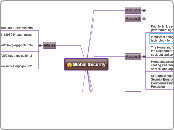Global Security
Module 1
Terrorism is the use of violence and threats to intimidate or coerce, especially for political purposes.
Terrorism involves the following components: Violence, Audience, Fear, Innocent Victims, and Political and Ideological Goals
Types of Terror: endemic, dynastic assassination, focused random terror, and tactical terror
Specail Operation Forces were put into place to fight terrorism, and provide counterterrorism tactics
Tyrannnicide is the assasination of a political leader
State Terrorism is acts of terrorism that the state committs against defenseless victims
Cycle of violence is an act of violence that results in another act that is equally violent
Module 2
2001 President Bush created the Office of HomeLand Security, the purpose was to protect the US from furthure more terroist attack
HomeLand Security created 5 levels of terrorism alerts
The government spends about $20 billiond dollars a year collecting intel on terrorist groups
There are 2 types of intel: Human Intel, and technical intel
Human intel is when a agents or operatives go into dangerous conditions to gather sensitive information
Technical Intel uses imgaes from satelites and aerail reconnaissance
Covert operations from the US has included subversion, propaganda, disinformation, and false documentation for foreign governments
Numerous treaties have been put into place locally and internationally to create a formalized structure to deter terrorismsuch as: The Bonn Agreement, The Nuclear Non-Proleferation Treaty, Biological Weapons Convention, and Chemical Weapons Convention.
Module 3
Prior to 9/11, security of the US was handled by a combination of government agencies, law enforcement agencies, and military
Insufficent traing for airport security, and failure to aquire new technology for bag screning is a main cause of 9/11
The Homeland Security Act was passed in 2002, thus creating the Department of Homeland Security, and their main goal is to seek out and prevent terrorist attacks in the US
Homeland security has created a list of long term goals in cluding awareness, protection, recovery, prevention, response, service, and organizational excellence
DHS broke itself into 4 divisions: Border and Transportaion Security, Emergency Preparedness Response, CBRN Countermeasures, and Information Analysis and Infrastructure Protection
Module 4
Domestic Terroism takes three main forms, insurgent terrorism, right-wing extremeism, transnational terrorism
Insurgent Terrorism includes nationalists, and anarchist groups that perpatrate issues with violence
Right-Wing Extremeism fight to protect the system as it is or return it to the way that it was. Groups included are white supremacists
Transnational Terrorismis networking or terrorist from national bounderies
The U.S. handles domestic terrorism acts as an ordinary criminal act
Domestic & International Terroris share the same tactics: kidnapping, hostage taking, hi-jacking,a dn bombings
Module 5
Suicide bombers are considered a new type of terrorist
Suicide bombing are the prefered method due to the fact that they are cost effective, accurate, and instills fear
Suicide bombing is a community activity
Chemical & Biologocal weapons are cheap put difficult to produce
It is a high probability that terrorist will continue to try and aquire Weapons of Mass Destruction
Chemical weapons include: Blistering, Blood, Choking, and Nevre Agents
Nuclear Weapons are the most powerful and destructive weapons. Nuclear weapons can cause widespread panic
Chemical weapons are abundantly available and easy to construct
Cyber Terrorist have many reasons to conduct cyber-terrorism: Curiosity, Excitement, Publicity, Personal gains, Revenge, Activism, Religious causes
Types of Cyber Attacks: Incursion, Destruction, Disinformation, Denial of Attack, and Defacement of Websites
Incursion is an Unauthorized access to a computer system or network
Destruction is the entry to a computer or network with intent to harm and damage
Diinformation is when information or rumors are spread
Denail of Attack is when an attack is designed to disalbe online operations
Defacement of Website is a form of vandilism targeted at a website
Module 6
Categories of Terrorists: Crazies, Criminals, Crusaders
Crazies are emotionally disturbed individuals that committ terrorism for reasons that dont make sense to others
Criminals perform terrorist acts for personnel gains
Crusaders committ terrorist acts to gain power and prestiege
Terrorist show dedications to a greater cause
Terrorist have a lack of pitty or remorse
Terroist are usually highly eduacated which help them carry out the most complex of plans
Terrorist show characteristic of motivation and religious fanticism
When recruiting new terrorist age, sex, education, economic status, socialization towards violence, alienation towards western values, religious fanaticism is looked at by the faction recruiting
Most terrorist attacks today do not have clear political goals
Module 7
Terrorism can be ethnic, ideological, religious, domestic, or international
Ethinic Terrorism isdeliberate violence by a sub national ethnic group to advance it causes
Goals of ethnic terrorists are to strenghten their ethnic identity and increase political control
Ethnic terrorist attack symbolic targets
Ideological terrorism are political terrorists that seek out targets for a symbol value to intemidate those that dont belong to their group
Political extremeist hardly ever resort to violence to help support their cause
Signle issue terrorism is seeking government change on a significant issue
Single issue terrorism are applied to controversial issuessuch as enviromental and animal right activists
Articles
Citation
Wilmot, R. & Ness, R. (2009), Domestic and International Terrorism. Pearson Custom Publishing,
